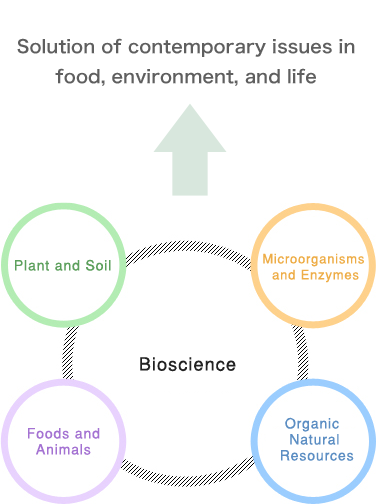Introduction
“Nougeikagaku” is a unique research field arising in Japan. It is originally the translation for “Agricultural Chemistry”. This area started about 140 years ago as the study of chemistry dealing simply with agriculture. Since then, research on various living organisms (plants, animals and microorganisms) and their bio-products related with agriculture has enabled the unique progress due to the wider range of systematic natural science. Nowadays, “Nougeikagaku” covers a wider range of studies on bioscience and biotechnology in the food, environmental and life sciences.
In 1877, the School of Agriculture was established at Komaba, Tokyo. At that time the course of Agricultural Chemistry (“Nougeikagaku”) was included in the school. The first students graduated from the course in 1883. The Department of Agricultural Chemistry was formed in the College of Agriculture of the Imperial University in 1893, which was renamed Faculty of Agriculture of the Tokyo Imperial University in 1919.
The department has always been at the forefront of bioscience and biotechnology, both in Japan and the world. Groundbreaking researches that originated from the department include the discovery of Oryzanin (Vitamin B1) by Prof. Umetaro Suzuki in 1910, isolation of gibberellins by Prof. Teijiro Yabuta in 1938, discovery of hiochic acid (mevalonic acid) by Prof. Gakuzo Tamura in 1956, and utilizing microorganisms in a fermentation environment to produce useful compounds by Prof. Kin-ichiro Sakaguchi.
In 1994, the Department of Applied Biological Chemistry and Department of Biotechnology were formed inheriting the faculty from the Department of Agricultural Chemistry. These two departments are united under the common research area of “nougeikagaku”. Graduates of these departments are very active in the field of food, fermentation, medicine, chemistry, and so on as well as being prominent in the academic world.
The Department of Applied Biological Chemistry and Department of Biotechnology consist of 39 laboratories which include 21 core laboratories, 9 affiliated laboratories belonging to the Agro-Biotechnology Research Center, Radioisotope (RI) Center and Research Center for Food Safety, 8 Endowed Chairs (which are also affiliated laboratories and two of which belong to the Agro-Biotechnology Research Center), and one concurrent laboratory belonging to the Department of Animal Resource Sciences. We provide high-quality education to all students irrespective of their age and region where they come from for both Masters and Doctoral Degrees. Our world-class research activity improves our teaching and our interactions with business and public organizations. The faculty members of the laboratories are engaged in undergraduate education in Major in Biological Chemistry and Biotechnology under Applied Life Science Course.

